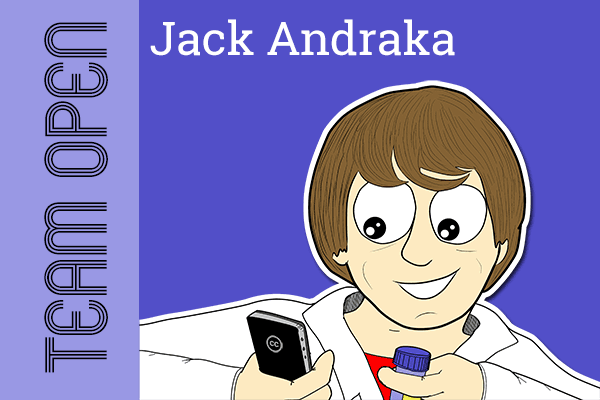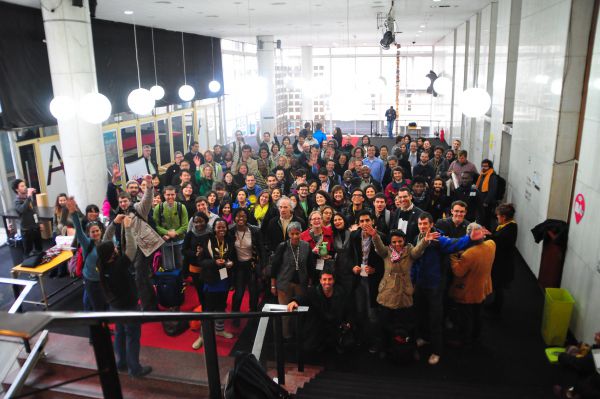Over the last year we’ve been working on developing two new projects: the Open Policy Network and the Institute for Open Leadership. Both of these initiatives arise out of a direct identified need from the Creative Commons community. Let’s explain a bit more about each of these projects.

Overview
Over the last several years, Creative Commons and related organizations have been contacted by multiple institutions and governments seeking assistance on how to implement open licensing and develop materials and strategies for open policies. By “open policies” we mean policies whereby publicly funded resources are developed and released as openly licensed resources. The $2 billion Department of Labor TAACCCT grant program would be considered an open policy. There is a pressing need to provide support to policymakers so they can successfully create, adopt, and implement open policies. And CC affiliates from around the world have asked for an informational hub where open policies could be shared and discussed.
The open community needs access to existing open policies, legislation, and action plans for how open policies were created, discussed and passed. Advocates need to know what barriers were encountered and how they were overcome, and because politics and opportunities are local, open advocates may need support customizing an open policy solution and strategy. This is why we need the Open Policy Network (OPN).
Mission
The mission of the Open Policy Network is to foster the creation, adoption and implementation of open policies and practices that advance the public good by supporting advocates, organizations, and policy makers with information and expertise, and connecting policy opportunities with those who can provide assistance.
Description of activities
The OPN supports the creation, adoption, and implementation of open policies around the world. We will engage in the following activities:
- Connect policy makers and other interested parties to expert open policy advocates and organizations who are able to provide assistance and support when open policy opportunities arise.
- Identify and build new open policy resources and/or services only where capacity and expertise does not currently exist, by providing needed resources, information, and advice.
- Provide a baseline level of assistance for open policy opportunities as they arise, to ensure no open policy opportunity goes unfulfilled.
- Link to, catalog and curate existing and new open policies and open policy resources from around the world.
- Connect open policy advocates and organizations on a listserv and monthly phone conference to maximize knowledge transfer and cooperation.
- Build new constituencies and advocates in support of open policies.
- Operate in a manner respectful of member organizations’ existing messaging, communities, and business models.
- Release all content produced under the project under CC BY and data under CC0, in a fully transparent manner on the project website.
Guiding principles
We believe:
Join this project!
For the time being, the Open Policy Network is being led by Creative Commons, but we envision that the coordination of the Network can be transferred to another group after some time. We are looking for interested individuals and groups to join the network, and we’ll begin monthly organizing conference calls soon. You can sign up to the Google group now.

Background
The Open Policy Network is committed to facilitating adoption of open policies around the world by improving access to resources and expertise for advocates of open policies. Creative Commons will begin to host an Institute for Open Leadership (IOL) to train new leaders in education, science, and public policy fields on the values and implementation of openness in licensing, policies, and practices. The Institute will be a tangible project under the umbrella of the OPN.
The Institute for Open Leadership will select twenty applicants per year–through a competitive application process–to participate in an intensive weeklong training session with leading experts in open fields. Each participant will develop an outcomes-based plan for a capstone open project, and report on progress within one year. Through training and the project period, participants will develop the skills, relationships, and motivation to become leaders for openness in their institutions and fields. The Institute complements and strengthens the OPN’s mission, and generates open policy projects by training a new corps of leaders ready to inculcate open policies and practices in their institutions and across their professional communities. We will initially run two cohorts of the Institute (2 years), though the goal is to make the Institute an annual event.
Problem meant to solve
There is significant and growing demand for leaders to support open initiatives in educational, cultural, and scientific institutions, as well as governmental agencies. At the organizational level, our capacity to meet this demand is limited. Yet we believe that there is strong potential to transfer and scale leadership experience to new champions for openness, and to systematically cultivate a broad network of leaders to meet the increasing demand. There is also significant interest among discretionary institutional funding programs (such as publicly funded national and state/provincial grants) to learn about and adopt CC licenses. A new and broader group of leaders could address this interest by reaching and educating institutions and professional communities about copyright and the benefits of open licensing and open policies.
As open movements approach mainstream status, there is a vastly increased need for more leaders who share the values of open licensing, the understanding of openness best practices (e.g. open technical formats, modular design, and accessibility standards), and the desire to guide some portion of this ecosystem. The IOL will relieve the strain on existing leaders and resources by recruiting and training a new group of experts who can meet the demand for expertise on open licensing, pursue new opportunities for publishing and using open content, and directly influencing policy decisions in institutions and across fields of work.
Activities
Application and selection process
Creative Commons will solicit applications from interested persons around the world to participate in the Institute. We will select a maximum of twenty participants each year for two years. We plan to target persons who are mid-level managers and/or potential leaders who are not currently involved in the open movement, but who are moving toward leadership positions in their institutions or fields of work over the next 5-10 years. The selection criteria will include an evaluation of which candidates the committee estimates will have the highest impact when they return to their home institution/government. All applicants will be required to propose a capstone open project they will complete after attending the IOL. These projects must be properly scoped and must contain a strong open policy component and contribute to increasing openness within their institution and field.
Prerequisites
Once selected, participants will be required, prior to attending, to complete any two online School of Open courses (e.g., copyright and open licensing, open education, open science, etc.).
Immersive training period
The IOL will be held at an appropriate conference facility or university campus. All participants and instructors will stay in the same accommodations and spend the majority of time together, creating the potential for informal discussions and relationship building. Institute instructors will be drawn from the top experts/leaders in the fields of open access, open science, open educational resources, open culture, etc. Each day of the week-long workshop will feature a concentration on open licensing and policy in one of the fields and include time for participants to consult directly with the instructors on their own open project plans.
Capstone project work
By the end of the workshop week, participants will have polished and expanded their proposed capstone projects and have integrated open policy aspects more thoroughly based on their newly acquired expertise and the assistance of the instructors. The point of the capstone project is for the participant to transform the concepts learned at the Institute into a practical, actionable, and sustainable initiative within his/her institution. Capstone open projects can take a variety of forms depending on the interests of the participant and the type of institution where the project will be implemented. Common features of a successful capstone open project will be to:
- Increase the amount of openly licensed materials in the commons;
- Increase awareness among colleagues or related stakeholders about the benefits of openness;
- Propose an open policy within the participants’ institution with an action plan to implement the open policy;
- Demonstrate measurable results and complete report after 12 months that analyzes project progress, challenges, and sustainability.
An example of a successful capstone open project might be a librarian at a university that is able to foster an open access policy at their institution whereby university faculty agree to contribute publicly funded research into the university repository under open licenses.
Reporting
In addition to the written reports (shared under CC BY 4.0), there will also be a webinar scheduled 12 months after the Institute to share the outcomes of each participant’s project. All webinars will continue fostering the development of a new open leadership cohort.
Timeline
- March-May 2014: Cohort #1 application period
- July 2014: Cohort #1 week-long institute
- November 2014-January 2015: Cohort #2 application period
- March 2015: Cohort #2 week-long institute
- July 2015: Cohort #1 12-month follow up webinar & open projects completed
- March 2016: Cohort #2 12-month follow up webinar & open projects completed
We’re excited to get these two exciting initiatives up and running, and we look forward to working with many individuals and organizations to make them a success. Many thanks to the William and Flora Hewlett Foundation and the Open Society Foundations for funds to kickstart these projects!
Institution designed by Thibault Geffroy from the Noun Project, licensed CC BY.





